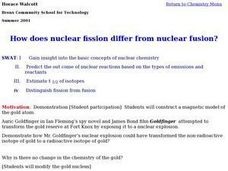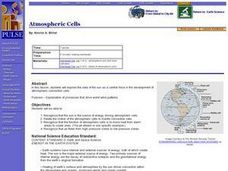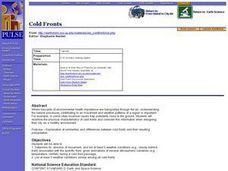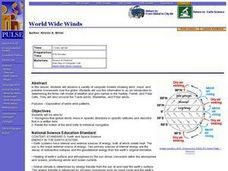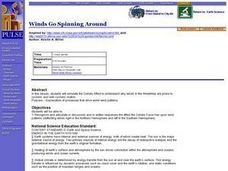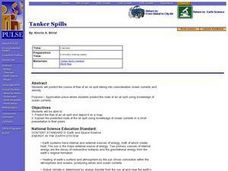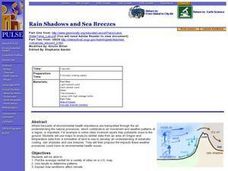Curated OER
Radiation Crossword Puzzle
In this radiation worksheet, students complete a crossword puzzle by figuring out the vocabulary terms associated with the 25 clues given.
Curated OER
How Do We Measure Absolute Time?-Geologic Clocks
In this absolute time worksheet, students define radiometric dating, tree rings and varves as means to measure absolute time. They are given information about each of these methods of dating.
Curated OER
Get a Half-life!
Students use m&m candies as their sample set. They begin by counting the total number of candies to determine their sample size. Students put the candies into a cup and shake them gently before pouring them onto a paper plate. Count...
Curated OER
Not In My Backyard: The Nature and Danger of Nuclear Radiation
Students evaluate the ways to control exposure to radiation and determine how to deal with the problem of nuclear waste in a rational rather than an emotional way.
Curated OER
Experimental Rate Law
For this reaction rate worksheet, students determine the molecularity of a reaction plus show that the predicted rate law equals the experimental rate law. This worksheet has 3 problems to solve.
Curated OER
How does Nuclear Fission differ from Nuclear Fusion?
Students examine concepts of nuclear chemistry. They compare and contrast the topics of nuclear fission and nuclear fision. They predict the outcome of reactions based on the types of emissions and reactants.
Curated OER
Acid Rain
Young scholars use real-time weather maps to determine the likelihood of acid rainfall in a region. Students apply their understanding of interaction between weather systems, land and air pollution, to address acid rain and the effects...
Curated OER
Atmospheric Cells
Pupils recognize that the sun is the source of energy driving atmosphere cells. They relate the motion of the atmospheric cells to mantle convection cells. Students recognize that the function of atmospheric cells is to move heat from...
Curated OER
Climate Patterns across the United States
Students articulate differences between climate and weather using examples in a written statement. Using climate data from across the country, they describe climate patterns for various parts of the United States on a map. Students...
Curated OER
Cold Fronts
Young scholars determine its' direction of movement, and list at least five weather conditions associated with the specific front, given animations of several atmospheric variables during a cold front passage. They list at least three...
Curated OER
Driving Currents
Students conduct a variety of investigations to see how water, heat, and salinity affect the flow of the world's ocean currents,as well as, explore many factors that affect the flow of the world's ocean currents. They also describe in...
Curated OER
World Wide Winds
Students recognize that global winds move in specific directions in specific latitudes and describe that in a written form. They relate the motion of the wind belts to historical navigation.
Curated OER
Winds Go Spinning Around
Students simulate the Coriolis Effect to comprehend why winds in the Westerlies are prone to cyclonic and anti-cyclonic motion. They arrive at an explanation of processes that drive world wind patterns
Curated OER
Tanker Spills
Young scholars predict the flow of an oil spill and depict it on a map. They explain the predicted route of the oil spill using knowledge of ocean currents in a short presentation to their peers.
Curated OER
Rain Shadows and Sea Breezes
Students plot the average rainfall for a variety of cities in the United States. Using the map, they work together to determine patterns on which toxicants are transported through the air. They determine the impacts of various weather...
Curated OER
Energy: Exploring Alternative Forms
In the study of science, there is always
going to be research, data, theories and wonderful new discoveries. I feel that my interest
about energy will help me design an adequate unit full of intrigue and discovery. The
pupils should also...
Curated OER
The History of Life
In this history of life worksheet, students complete a crossword puzzle by figuring out the vocabulary words associated with the 11 clues given. Then students review how paleontologists use fossils to learn more about past living things...
Curated OER
What is a Pico?
Students label objects in their classroom based on mass and volume using the metric system. They examine the relationship between the numerical value and the corresponding metric unit.
Curated OER
How Does Radiation Affect You?
Students identify the use and misuse of radiation. They examine human activities that add to the exposure of radiation. They also discover how it can be useful in saving lives.
Curated OER
Radiation In Our World
Students identify the different sources of radiation around us. In this physics lesson, students calculate their estimated radiation exposure per year. They research a current issue about radiation.
Curated OER
Polishing the Petoskey
Students select a stone and polish it. Throughout the process they demonstrate an understanding of rocks and fossil formation.
Curated OER
How Sensitive Are The Lungs to Radon?
Students examine the effects of radon on the lungs. They review pictures of the lungs on a large and small scale. They work together to answer questions to complete the lesson.
Curated OER
Air Masses
Students examine the physical characteristics of several types of air masses to discover how air masses can be identified and defined by their temperature and moisture content.
Curated OER
Current Interactions
Students design an experiment to see how wind, temperature, and salinity work together to influence ocean currents and present it in a report format. They explain to their classmates how experiment findings relate to ocean currents.







